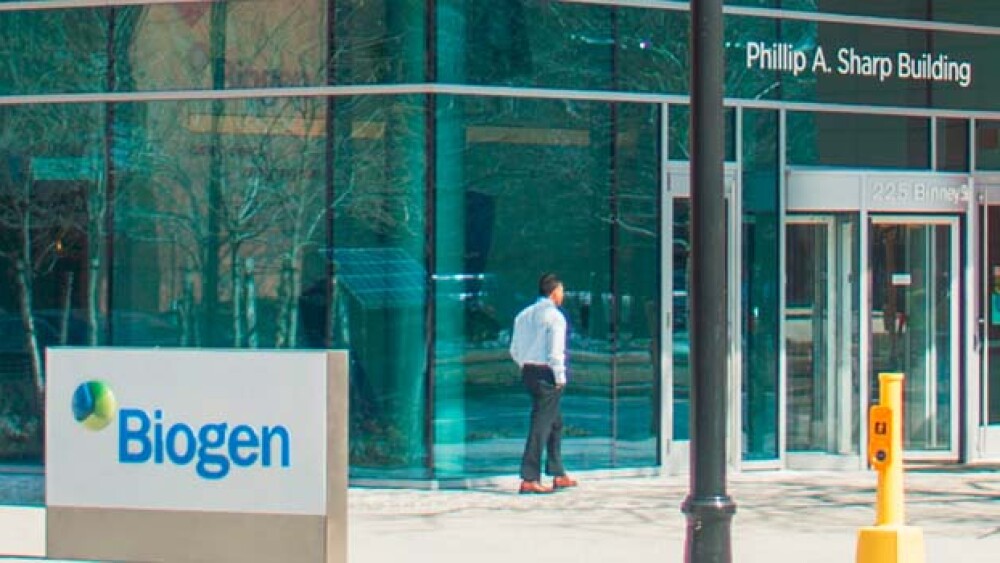News of the buy was tucked away in the company’s fourth-quarter financial report.
Tucked away in its fourth-quarter financial report, Biogen included the news that it had acquired an IND-ready asset from Karyopharm Therapeutics for $10 million upfront.
Karyopharm, headquartered in Newton, Mass., inked the deal with Biogen for its oral SINE compound KPT-350 and other assets to treat several neurological and neurodegenerative conditions. KPT-350 inhibits XP01, which reduces inflammation and neurotoxity while increasing neuroprotective responses. Although it has broader potential applications, the initial focus is on amyotrophic lateral sclerosis (ALS).
Biogen is paying Karyopharm an upfront payment of $10 million, with a potential $207 million in development and commercial milestones. In addition, Karyopharm will be eligible for tiered royalty payments up to low double digits if the product becomes approved for commercial sale.
“We believe that, as a global innovative leader in neuroscience that brings world-class capabilities in developing and commercializing products targeting a broad range of neurological conditions, Biogen is well suited to further advance the development of KPT-350,” said Michael Kauffman, Karyopharm’s chief executive officer, in a statement. “This transition is part of our broader strategy of partnering our non-oncology assets while we focus on our primary objective of executing the development of oral selinexor, our lead oncology candidate, pursuing regulatory approval in the United States and European Union, and transitioning toward a commercial-stage enterprise.”
Otherwise, Biogen reported total revenues for 2017 of $12.27 billion, up 7 percent from $11.4 billion in 2016. Multiple sclerosis (MS) revenues rose 4 percent from 2016 to $9.1 billion. Growth was driven by its new drug, Spinraza, for spinal muscular atrophy (SMA), bringing in $884 million this year.
Early in 2017, the company spun off its hemophilia business into Bioverativ. Earlier this week, Sanofi acquired Bioverativ for $11.6 billion.
“In Q1 2017, Biogen completed the spin-off of its global hemophilia business into a new company, known as Bioverativ,” Michel Vounatsos, Biogen’s chief executive officer stated. “The 15% increase in total revenues excludes all hemophilia revenues form 2016 through January 2017. Hemophilia revenues include Eloctate and Alprolix product revenues as well as royalty and contract manufacturing revenue related to Sobi.”
Although many investors and analysts expected Biogen to make a big acquisition, the Karyopharm deal is not the deal they were expecting. Most expect 2018 to be a big year for mergers and acquisitions due to the changes in the U.S. tax laws benefiting corporations and freeing up cash. The Sanofi-Bioverativ deal was one, with Celgene picking up Juno Therapeutics this week for $9 billion and earlier, buying Impact Biomedicines for $1.1 billion.
But the Karypharm deal, despite disappointing investors and analysts, seems consistent with Biogen’s 2017 approach, acquiring assets from companies to bolster its pipeline. Last year the company added seven clinical programs to its neuroscience pipeline. They include BIIB098 for MS, BIIB092 for Alzheimer’s disease and progressive supranuclear palsy, BIIB076 for Alzheimer’s, BIIB080 for Alzheimer’s, BIIB093 for large hemispheric infarction, and natalizumab for drug-resistant focal epilepsy.
“2017 was a year of strong execution at Biogen,” Vounatsos stated. “With a renewed focus on our strategic priorities, we delivered record full year revenues, solid earnings, and significant progress in strengthening the foundation for our future with seven additions to our neuroscience pipeline in 2017.”





